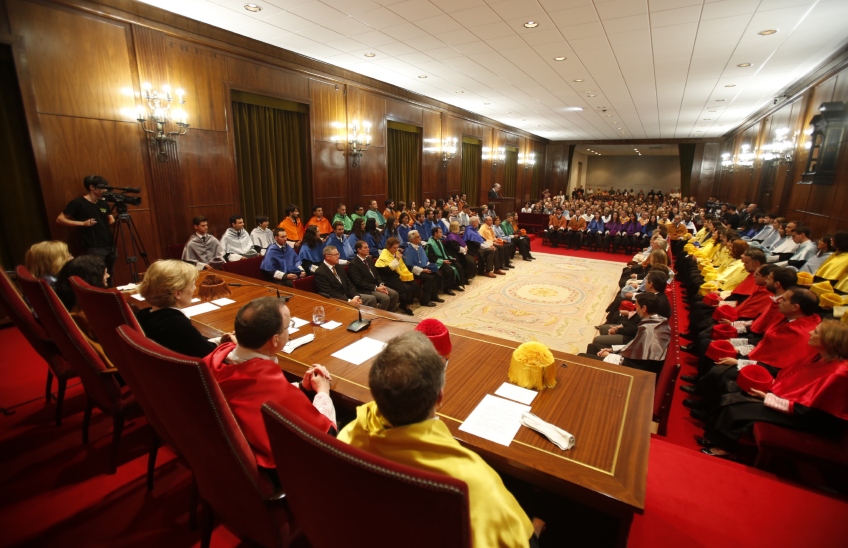University president encourages researchers to commit to truth and freedom
The University has celebrated the investiture of 176 PhDs from 27 countries, in a ceremony attended by the Nobel Prize in Chemistry Morten Meldal.

FotoManuelCastells/ A moment during the doctoral investiture ceremony.
06 | 06 | 2023
"I encourage you to be people who are not anti-anything or anti-anyone, committed to the truth and, therefore, lovers of freedom". This is how the rector of the University of Navarra, María Iraburu, addressed the researchers present at the investiture ceremony. In the last year, between June 2022 and June 2023, a total of 176 PhDs from 27 countries have defended their theses at the academic center.
The rector, who presided over the event, pointed out that these attitudes are typical of the university spirit: "Whatever your professional future may be, they will help you to put your qualities at the service of society, forming links, building bridges, helping to overcome fractures and joining forces to create projects in the service of the common good".
The event was also attended by the sponsor and professor of the Faculty of Canon Law, Antonio Viana; and Marta Alonso Sanz, PhD from the Faculty of Economics, who spoke on behalf of her class. The event was also attended by Morten Meldal, winner of the 2022 Nobel Prize in Chemistry, who visited the University to give a master class organized by the Faculty of Pharmacy and Nutrition.
The new doctors come from 27 countries: Argentina, Australia, Brazil, Chile, Colombia, Congo, Dominican Republic, Ecuador, El Salvador, France, Guatemala, Honduras, Hungary, Italy, Latvia, Mexico, Nicaragua, Nigeria, Peru, Philippines, Poland, Portugal, Spain, United States, Uruguay, Tanzania and Venezuela.
Influence of political or ideological positions.
In her speech, the rector reflected on a central theme in the task of research and in the university as an institution: the connection between freedom and truth. "Teaching is the search for truth, and that search is only possible in a context of freedom," she said. In his opinion, this, which we could consider an indisputable starting point, "is being threatened in recent years from different quarters, and requires a response from researchers and universities".
One of the fronts that threatens this quest, according to Professor Iraburu, is the influence of political or ideological positions in the university, "especially significant in the U.S. university system, but by no means exclusive to it". The examples, she explained, are very varied: from boycotting lecturers or suing professors for content that is offensive to students, to bills that prohibit the teaching of certain subjects or the funding of research on certain topics. Censorship," he pointed out, "puts at risk the freedom necessary for students and professors to be able to apply themselves with rigor and dedication" to research.
To ensure an atmosphere of freedom, the rector proposed, as the founder of the University, St. Josemaría Escrivá, used to say, not to be "anti-anything or anti-anyone." "The true seekers of truth are ready to establish an open, patient and respectful dialogue with everyone and to recognize it wherever it is, whoever it comes from.
A tapestry like that of Penelope
Antonio Viana, sponsor of the graduating class, spoke of the main benefit of the doctorate, which, beyond the prestige and professional possibilities, produces "a kind of transformation". "Each well-oriented doctoral work is a contribution that, together with others, allows us to broaden our vision of reality, of personal situations, of the real and not whimsical or merely sentimental needs of society. It is a contribution to intellectual and social progress". "Before the last terminator eliminates Sarah Connor and artificial intelligence takes care of everything, we have excellent university students who have allowed themselves to be transformed by work," he added.
For her part, Dr. Marta Alonso stressed that "the thesis has been a tapestry that has needed to be woven and unwoven as many times as Penelope's when she was waiting for Ulysses". She also stressed that in the willingness to serve others lies the difference between doing the best work and making others better with our work: "If we live like this, others will continue to weave the tapestry that one day we began with the thesis; they will continue to guard the memory, to find the truth and people to help".
The theses defended in the last year have been made possible thanks to the contribution of the Asociación de Amigos de la Universidad de Navarra, Banco Santander, Fundación Científica Asociación Española contra el Cáncer and other public organizations.
Doctors who have defended their thesis in the last year:
|
Faculty of Law
Faculty of Medicine
Faculty of Philosophy and Letters
Faculty of Science
School of Communication
|
IESE
School of Canon Law
Tecnun School of Engineering
School of Pharmacy and Nutrition
School of Architecture
Faculty of Theology
Faculty of Economics
Ecclesiastical Faculty of Philosophy
School of Nursing
Faculty of Education and Psychology
|
